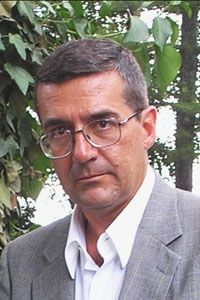General Pierre-Marie Gallois, RIP
| Activities - Comments |
About the Author
Dr. Srdja Trifkovic, an expert on foreign affairs, is the author of The Sword of the Prophet and Defeating Jihad. His latest book is The Krajina Chronicle: A History of the Serbs in Croatia, Slavonia and Dalmatia.
General Pierre-Marie Gallois, RIP
by Srdja Trifkovic
- No Related Post
[Subscribe online to Chronicles: A Magazine of American Culture. Click here for details].
 General Pierre-Marie Gallois, who died on August 23 in Paris at the age of 99, will be remembered primarily as the architect of France’s nuclear deterrence doctrine in the 1950s. He was the last in a long line of European geopolitical thinkers—from Clausewitz and Jomini to Liddell Hart and Guderian—who have combined superbly honed analytical skills with hands-on soldiering.
General Pierre-Marie Gallois, who died on August 23 in Paris at the age of 99, will be remembered primarily as the architect of France’s nuclear deterrence doctrine in the 1950s. He was the last in a long line of European geopolitical thinkers—from Clausewitz and Jomini to Liddell Hart and Guderian—who have combined superbly honed analytical skills with hands-on soldiering.
Gallois was one of the most impressive men I have met. Back in 1993 I enjoyed his hospitality at his sprawling flat at No. 8, rue Rembrandt, just south of the Parc de Monceau. He was in his early eighties then, a dynamo of physical and mental energy dividing his time between an insane writing and speaking schedule and the painting of a five-story mural on the courtyard side of the building. It was an old love: before joining the French air force in 1935 he had studied arts and worked for a company that created lighted ads that hung on the Eiffel Tower. Speaking in a staccato English, accented but fluent, he insisted that a true soldier has to be an artist at heart: “You need a vision, an image of what lies beyond, a sense of the greater reality.”
His vision was shaped by the trauma of France’s debacle of May 1940. Two years later Gallois fled from Algeria, where he was serving as an air force officer on the staff of the Fifth air region, to London. He placed himself at General Charles de Gaulle’s disposal and joined the RAF.
A decade after completing thirty bombing raids over Germany, Colonel Gallois joined the cabinet of the French minister of defense. From there he was seconded to the Supreme Headquarters Allied Powers Europe (SHAPE), studying the effect of nuclear weapons on modern strategy. He came to the conclusion that the atomic bomb was the only opportunity for his country to regain that great power status that he knew was no longer rightfully hers on the basis of economy, demography, or spirit. The alternative, he realized then and reiterated half a century later, was to accept France’s fatal dependence on a hegemonistic yet unreliable America—a “totalitarian democracy” devoid of any sense of its normal limits.
A geopolitical realist who believed in “peace through fear,” he was attacked in the English-speaking world as an advocate of nuclear proliferation. He responded by arguing that the possession of a nuclear arsenal was the key prerequisite to ensuring deterrence, and added, provocatively, that the spread of nuclear weapons could increase international stability. He claimed that nuclear weapons raise the stakes and forces all actors to show greater restraint in crises involving more participants with nuclear weapons. As the number of nuclear actors involved increases, Gallois claimed, the likelihood of war would continue to fall.
Gallois’ tenure at SHAPE convinced him that France could not afford to entrust its strategic defense to the American nuclear umbrella in perpetuity. As he recalled many years later, he shared his concerns with his boss, General Lauris Norstad:
My idea was to explain to him that the American risk was increasing with time, with the advent of new weapons, such as long-range ballistic missiles . . . Before 1960, when the Americans were out of reach, we had no doubt in our minds that they would use atomic weapons from the onset of any serious attack against any country of Europe, because they were out of reach themselves. The risks were small, after all. But it was easy to foresee that ten years later, the situation would change: Americans being in the first line, in the same position vis-à-vis the enemy as Europe, they would change their strategy and try to reduce the atomic commitment. Hence, we had to find a substitute, and General Norstad agreed. He said to me that was probably what was going to take place, and he said you should inform your government.
In 1956 Gallois started his lobbying campaign focused on his conviction that France needed its own force de frappe, independent of America. The venture was professionally risky for him, and potentially embarrassing for his boss at SHAPE. His long talk with the Socialist prime minister, Guy Mollet, was a success. His reasoning was based on the discussions with Norstad:
Back then the ballistic missiles could not reach America, but it was obvious that, after some years, these weapons could hit American soil . . . As soon as Americans were on the frontline as we were already, they would change their strategy. Then, my country, and possibly other countries of Europe, had to find a substitute for a North American commitment. The defense of Europe was nonconditional before, but it would be conditional later.
He was right, of course, but the conditionality in question—and its implications for Western Europe—only became apparent after the Cuban missile crisis, six years later.
Three days after speaking to Mollet, Gallois met de Gaulle—then out of politics and largely out of the public eye—and talked to him at some length:
I went to see General de Gaulle at Hotel La Perousse, where every Wednesday evening he was receiving friends . . . I stayed with him until three in the morning, showing him some 40 charts . . . He said that it is not necessary to have the same number of weapons as the other side; what is mandatory is to be capable to arrachet—to ‘tear off’ one arm of the foe. . . . He said to me, ‘Look, Gallois, you should take some rest now; in the future, I shall take care of your career.’ So I went back home, and I told my wife that I had just met Louis XIV, and that my name was written down on his list.
In 1958 General de Gaulle came to power and transformed the budding force de frappe into “the weapon of the French nation,” as Gallois put it,
having in mind that the effects of these weapons are so terrible, that you cannot share their use, and that only a nation may decide to use them. Using such a weapon as a last spasm; accepting to die standing straight, instead of dying laying down. It was really a last resort weapon. You cannot share such a weapon with another state.
In the final decade of the Cold War Gallois was strongly opposed to the strategic thinking then prevalent in Washington. Following the collapse of the Soviet Union Gallois agreed with Senator Pierre Biarnès that America was becoming “unbearable” in the imposition of its brand of quasi-moral, mercantile hegemony on the rest of the world. He came to regard the U.S. policy as fundamentally detrimental to European interests, and claimed that the U.S. sought to désouverainise European nation-states. Germany goes along with this “monstrosity,” he told me, although it is not at all in Germany’s interest, because “the flawed idea of ‘one Europe’ is an old obsession for the Germans.” To push that dream, old nation-states have to be destroyed, which explains why the United States was so hell bent on undermining Russia and Serbia. France should have responded by rebuilding links with “our traditional allies,” Gallois believed.
His views on the Balkans could have come straight from the pages of Chronicles. In his 1995 book Le soleil d’Allah aveugle l’Occident (The Sun of Allah Blinding the West) he took note of the “obstinacy with which the U.S. is wishing to impose an Islamic Bosnian state in Europe” and warned that “it is not in the interest of the U.S. to support through diplomacy and weapons a Sarajevo regime that will be . . . sooner or later swept by the fundamentalist current.” Through its intervention in the Balkans, Gallois wrote, America was vainly hoping to change the fact that the majority of Muslims saw the U.S. as the Great Satan.
Disgusted by the American overt support of Croats and Muslims, Gallois wondered, in an article published by Le Figaro on September 30, 1993, “Should we return to the kind of political stability and territorial arrangements imposed by the Austro-Hungarians on one half of the Balkans and the Turks on the other half, with Germany, tomorrow, in place of the Dual Monarchy of yesterday, and the new Turkey as the latter-day Ottoman Empire?” His rhetoric was prescient: 17 years later, Croatia and Slovenia are firmly in the German orbit within an ugly caricature of “Europe,” while neo-Ottomanism thrives east of the old Military Border.
Pierre-Marie Gallois was among the last European public figures of prominence to grasp that certaine idée de l’Europe, and to live by it. He was a patriotic Frenchman contemptuous of what France has become, a proud European who therefore loathed the European Union, a royalist loyal to the Republic, a practicing Catholic who loved the Orthodox Serbs. A good man.
>>SEE COMENTS<<
| < Prev | Next > |
|---|
| Overstatement from Davos 2017. |
Liberal corporative capitalism, for reasons of lowering traveling costs, proposed not to travel to history alone but packed togather with NATO, EU and unipollar World Order. Workers participation has good chances to step in provisionally, buying time for full scale workers selfmanagment. |









